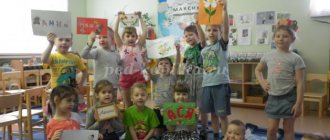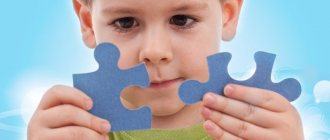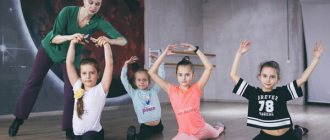When a child goes to kindergarten, parents experience real stress. They don’t know how the child will be received in the new team, how the teachers will treat him, whether he will eat and play normally.
The main problem is that not everyone understands that even the smallest child is a full-fledged citizen of the country. Accordingly, he can count on the protection of the state from the first days of his life, regardless of where he is. Therefore, before starting training in a preschool educational institution, it will be useful to visit the organization and carefully study the information that should be presented in the child rights corner in the kindergarten. Let's take a closer look at some important points.
Enrollment in preschool educational institution
Some parents prefer to be content with the meager information that the kindergarten administration provides them. However, it is very important to know your rights and the rights of your baby. First of all, when visiting a preschool educational institution, each parent can clarify both the qualifications of the teachers and the plan of classes and entertainment events.
However, there is not always money for legal advice for parents, especially considering how much such training costs today. In this case, it is recommended to read the reviews of other parents about the chosen preschool educational institution.
In addition, parents have the right to visit the educational institution during classes and make sure that they are going on as normal. Also, speaking about the rights of a child in kindergarten, it is worth noting that his father and mother should be given the opportunity to personally talk with each of the teachers and get acquainted with their documents.
It is recommended that you read the agreement first. It must provide comprehensive information. The contract also stipulates the rights of the child in kindergarten. These conditions can be divided into two categories.
How does the state ensure the rights of a young citizen?
A small child, like any citizen of the country, has his own rights and freedoms, which are guaranteed by the state and should not be violated.
They are determined by the list of regulatory documents of the Russian Federation:
- Convention on the Rights of the Child , signed by UN countries on November 20, 1989. Russia also signed this international document;
- Federal Law-273 “On Education” dated December 29, 2012;
- Federal Law-124 “On the basic guarantees of the rights of the child in the Russian Federation” dated July 24, 1998;
- Declaration of the Rights of the Child of November 20, 1959;
- Family Code of the Russian Federation.
Before sending a child to a preschool educational institution (PED), parents should familiarize themselves with the basic rights of the child so that they are correctly implemented by the teaching staff of the kindergarten.
The right to develop creative abilities
In this case, we are talking about the fact that, in addition to regular classes, quiet time and walks, the child should be given the opportunity to realize his talents. This means that preschool educational institutions must conduct classes aimed at developing the child’s mental and logical thinking.
Moreover, these rights of a child in kindergarten are recommended by the government of the Russian Federation. At the same time, Federal programs have been developed that all preschool educational institutions without exception must follow. If a kindergarten representative states that they are not obliged to provide such services, then this is a gross violation of the law. In this case, we are talking about violation of the rights of a child in kindergarten. For parents, this may be a clear reason to appeal to higher authorities. You can find out more about these conditions by reading the Education Law.
In addition, in the process of conducting general programs, teachers are obliged to preserve the individuality of the child. Thus, a differentiated approach must be found for any child that will help develop his talents and individual abilities.
Child rights in kindergarten
A child is endowed with individual rights from the day of his birth. This is spelled out in detail in the UN Convention. Parents are obliged to monitor compliance with the prescribed laws and correctly defend their rights in the event of inadequate care for their children in preschool institutions.
Psychological comfort
While in an institution, a child has every right to comfortable conditions close to home. About 10 years ago, it was possible for a babysitter to reluctantly clean up the baby’s half-eaten porridge, with complaints and threats towards him. Today, kindergartens are modern, clean, equipped, and have all the necessary equipment for games and children’s development.
Of course, parents are more concerned about the emotional situation in institutions. It's not a matter of fancy equipment, but, first of all, relationships, respect for children, and meeting their requirements.
It is forbidden:
- prohibit the baby from going to the toilet if he persistently asks for it;
- threaten with refusal to go for a walk if the child does not finish the soup or spills it accidentally;
- divide children into best and worst , reproaching the latter for this;
- remove the child from games if he is guilty;
- separate him from the rest of his classmates by seating him in a corner on a separate chair;
- raise your voice, shout at the child , as well as use obscene language, counting on the fact that the children will not understand, and there are no adults or strangers in the room.
Psychological violence against children, pressure, humiliation, unfortunately, is still present in kindergartens. Parents need to deal with these problems, bring complaints to the head and, if necessary, go to the police and court.
The task of parents is to uphold the rights of children and protect them. Psychological discomfort is unacceptable; inaction, leaving problems unattended is a crime against children, you need to know and remember this.
Children's rights in kindergarten: what does the law say?
According to the laws adopted in the Russian Federation, a child has the right in a preschool educational institution to:
- health , if necessary, preschool institutions should provide medical care to children.
- development and realization of their creative and physical abilities in kindergarten. Teachers are required to develop children’s creative abilities, speech, and thinking, that is, conduct various classes and develop the abilities that every child has from birth.
- mental peace in the team , teachers should not allow cruel treatment of children, gross physical and sexual violence against them.
- There should be no emotional abuse . Remarks, threats, and offensive criticism towards one's children are unacceptable in a preschool educational institution, just as it is impossible to lie to children or deliberately isolate them from society. The method of education with raising the voice and shouting at children is considered by many to be quite normal and commonplace, but this is also a violation of the rights of the child. Impressionable children can quickly become traumatized, and psychological harm can affect them in the future.
Right to play and recreation
As you know, at a young age, children learn information much better in a playful way, so it is very important that preschool teachers give children this opportunity to develop not only their intellectual, but also creative abilities.
Also, the rights of a child in kindergarten include the opportunity for socialization. Children are just learning to interact with a team, so the leadership of an educational institution cannot deprive them of this opportunity. In the process of playing with other students, kids develop morality and other necessary qualities.
In addition, speaking about what rights a child has in kindergarten, it is worth noting that classes must alternate with rest and other entertainment that does not require mental stress. If after a day in kindergarten the child comes home tired and completely exhausted, then this indicates that the teachers of the institution are not coping with their responsibilities. Thus, they do not fulfill their job descriptions.
Consultation for parents » Children's rights»consultation
Consultation for parents "Child's Rights".
Documents regulating the Rights of the child:
— Declaration of the Rights of the Child;
— UN Convention on the Rights of the Child;
— World Declaration on the Survival, Protection and Development of Children.
In our country, in addition to these documents, a number of legislative acts have been adopted:
— Family Code of the Russian Federation;
— Law “On Basic Guarantees of the Rights of the Child in the Russian Federation”;
- Education Act".
The listed documents proclaim the basic rights of children: to a name, citizenship, love, understanding, material security, social protection and the opportunity to receive an education, develop physically, mentally, morally and spiritually in conditions of freedom. A special place is given to protecting the rights of the child. It is stated that the child must receive timely assistance and be protected from all forms of neglect, cruelty and exploitation.
Legislative acts recognize every child - regardless of race, skin color, gender, language, religion, political or other beliefs, national, ethnic and social origin - the legal right to education, development, protection, active participation in the life of society. The rights of the child are linked to the rights and responsibilities of parents and other persons responsible for the lives of children, their development and protection.
Art. 65 clause 1 of the Family Code states that “parental rights cannot be exercised in conflict with the interests of the children. Ensuring the interests of children. Ensuring the interests of children should be the main concern of their parents. When exercising parental rights, adults do not have the right to harm the physical and mental health of children or their moral development. Methods of raising children must exclude neglectful, cruel, rude, degrading, treatment, insult or exploitation of children.
Every child, in accordance with the norms of domestic and international law, has the following rights and freedoms in the field of family relations:
- live and be raised in a family;
- know who his parents are;
- to live together with them (except when this is contrary to his interests) and to be cared for by them;
- to be raised by parents, and in their absence or deprivation of parental rights - to be raised by a guardian, trustee or child care institution;
— for comprehensive development;
- respect for human dignity;
- to communicate with parents, grandparents, brothers, sisters, and other relatives; This right is also reserved for a child in an extreme situation, that is, in a pre-trial detention center, hospital, etc.;
- for protection;
- to express one’s own opinion;
- to receive a surname, name, patronymic;
- to obtain funds, subsistence and own income.
Tips for parents:
- The child is not to blame for anything. Not that he was born. Not that it created additional difficulties for you. Not that it didn't meet your expectations. And you have no right to demand that he solve your problems.
- A child is not your property, but an independent person. And you have no right to decide his fate, much less ruin his life at your own discretion. You can only help him choose a path in life by studying his abilities and interests and creating conditions for their implementation.
— Your child will not always be obedient and sweet. His stubbornness and whims are as inevitable as the very fact of his presence in the family.
“You yourself are to blame for many of the child’s whims and pranks.” Because they didn’t understand him in time. They spared their time and energy. They began to perceive it through the prism of unfulfilled hopes and simply irritation. They demanded from him what he simply could not give you - due to his age or character, i.e. they didn’t want to accept him as he was.
- You must always believe in the best that is in the child. To the best that will still be in it. Do not doubt that sooner or later this best will certainly manifest itself. And remain optimistic in all pedagogical adversities.
The child learns what life teaches him
(Barbara L. Wolf)
If a child lives in an atmosphere of love and acceptance, he learns to find love.
If a child is treated with hostility, he learns to fight.
If a child is ridiculed, he learns to be shy.
If a child is shamed, he learns to feel guilty.
If a child is forced to show tolerance, he learns patience.
If a child is encouraged, he learns self-confidence.
If a child is praised, he learns gratitude.
If a child is treated fairly, he learns justice.
If a child grows up in safety, he learns to trust.
If a child is treated with approval, he learns to love himself.
Commandments of a wise parent
The child must be respected and seen as an individual; do not forget also that education is a “long-term” process; you cannot expect instant results. If for some reason your baby doesn’t live up to your expectations, don’t get angry. Calmly think about what you can do to make the situation change over time, do not try to make the child the best one.
It does not happen that a person knows and can do everything equally well. Even the oldest and wisest are incapable of this. Never say: “Masha is already reading at the age of 4, and you!” or “When I was your age, I did 20 push-ups on the horizontal bar, and you are just a mattress.” But your Vasya glues paper boats. Surely there is at least one thing that he does better than others. So praise him for what he knows and can do, and never scold him for what others can do!
Do not compare your child out loud to other children.
Take stories about the successes of other people's children as information. If the conversation that “Misha from the second entrance plays the violin unsurpassed” takes place in the presence of your child, you also need to say something in response. It is important that your child knows that you love him for who he is! Stop blackmailing your child. Eliminate the following phrases from the dictionary forever: “I tried, but you...,” “I got sick, and you...” Parents, in the language of the criminal code, this is called blackmail! The most dishonest of all attempts to shame, and it is also the most ineffective. Avoid witnesses! If a situation really arises that makes you blush (a child was rude to an old man, threw a tantrum in a store), you need to take him away from the scene. After that, calmly explain why this cannot be done. After all, self-esteem is not only inherent in adults, so it is very important that the conversation took place without witnesses. You need to talk firmly and decisively. Here it is quite appropriate to call the child to shame. The main thing is not to forget that there is a measure for everything.
What rights does a child have in the family?
Every born child has the following rights:
*live and be raised in a family, know your parents;
*to communicate with parents and other relatives when the child lives separately from the parents or one of them, as well as in cases where the parents live in different states;
*for family reunification (if necessary, the child has the right to obtain permission to enter and exit the country);
*to receive maintenance from their parents and other family members; in this case, the funds due to the child in the form of alimony, pensions, benefits are placed at the disposal of the parents and spent by them on the maintenance, education and upbringing of the child;
* for care and education by parents and persons in their stead, as well as the state (in the event that the child is left without parental care);
*respect for dignity and protection from parental abuse.
Rights to life and health
This guarantee is fundamental. In order for this right to be realized, it is necessary to carry out a number of activities on safety rules and other instructions that children must know.
In addition, a doctor must be present at the preschool educational institution who can provide the children with the necessary assistance in case of illness or injury. If there is no such specialist in an educational institution, this indicates a violation of the child’s rights in kindergarten.
Of course, no illegal actions can be committed against the baby that could cause him physical or psychological harm. In this case, we are no longer talking about a violation, but about a more serious crime. If a teacher threatens, unfairly punishes, insults or beats a child, then in this case he must bear criminal liability for his actions.
Consultation for preschool teachers
A child’s feeling of trust appears very early, at an age when a person still does not remember anything. But it is in early and preschool childhood that a child develops trust in himself, in people, in the world, his character is formed, his self-esteem and confidence are strengthened.
The Declaration of the Rights of the Child, adopted on November 20, 1959, is the first international document protecting the rights of children.
The Convention on the Rights of the Child defines the full rights of children to enjoy educational services, various achievements of culture and civilization, defines the right to rest and leisure, as well as other rights that UN member states must provide to children. The Convention on the Rights of the Child is the main international legal document that addresses the rights of the child from the point of view of international law. The Convention includes 54 articles that describe in detail the rights of children from birth to 18 years of age to living conditions without hunger, want, exploitation, cruelty and other forms of violence from society, as well as the right to the cultural and spiritual development of the child’s personality.
The document contains four basic requirements that must ensure the rights of children: survival, development, protection and ensuring active participation in society. The Convention contains two fundamental principles:
- A child is an independent subject of law, that is, he has the full range of civil, political, social and cultural human rights.
- Prioritizing the interests of children over the needs of family, society, and religion.
Children's rights are a set of children's rights enshrined in international documents on children's rights. According to the Convention on the Rights of the Child, a child is a person under 18 years of age. The state undertakes to protect children, so they have the same rights as adults.
- The child has the right to a family.
- The child has the right to care and protection from the state if there is no temporary or permanent protection from the parents.
- The child has the right to attend school and learn.
- The child has the right to equality.
- The child has the right to freely express his thoughts.
- The child has the right to his own opinion.
- The child has the right to a name and citizenship.
- The child has the right to receive information.
- A child has the right to protection from violence and abuse.
- The child has the right to medical care.
- The child has the right to rest and leisure.
- The child has the right to additional assistance from the state if there are special needs (for example, children with disabilities).
Teachers are unanimous in the opinion that close people play a special role in the development of a child’s personality and physical and mental well-being.
Educational tasks of preschool teachers
- To form in preschool children the basics of civil law knowledge, expressed in their conscious application.
- Develop a friendly attitude towards loved ones, adults and peers, awaken emotional responsiveness to their condition.
- Provide every child with the opportunity to feel important and competent. Create conditions for practicing concrete and practical actions in law.
- Conduct legal education of parents, identify a group of families at risk in which a violation of the child’s rights is possible or actually occurring.
Educational tasks of preschool teachers
- Love the child for who he is.
- Respect the individuality of each child, fostering dignity and responsibility for themselves and their actions.
- Praise, encourage, approve of the child, creating a positive emotional atmosphere around him.
- Believe in the capabilities of each child, in the prospects for his development, and find his strengths.
- Reveal the child's soul before his mind.
- Act in such a way that every child feels that the possibilities are inherent in him. “You can do anything” is the main formula of education.
- Teach your child hard work, caring for others, and respect for other people.
- Make the child’s parents your allies in education.
Peculiarities of observance of children's rights to childhood in preschool groups
Junior preschool age (3-5 years)
The Convention on the Rights of the Child aims to ensure the full development of the personality of the child in every corner of the earth. Many teachers try to introduce children to it as early as possible. With little ones, there is no need to specifically teach children's rights. It is necessary to really protect and protect them from evil, to protect them. And this is the task of adults. The Convention on the Rights of the Child should be known to specialists - lawyers who deal with juvenile justice, teachers and, of course, parents. And a child, especially a small one, already has few defenders. The image of an adult as a fair, kind defender must be formed in a child at an early age.
Senior preschool age (5-7 years) In order to develop in children basic ideas about rights and freedoms, respect and tolerance for other people, it is important not only to provide knowledge, but also to create conditions for their practical application. You should choose the most important types of activities for preschoolers - playful and artistic-productive. It is recommended to conduct role-playing, theatrical and didactic games, exercises to develop the emotional sphere, communication skills. The child needs to practice reproducing learned actions, to see from the outside what this or that action looks like, what feelings and emotions it evokes. For this purpose, problem-search activities of children are organized (resolution of problematic situations), conditions are created for productive activities (making emblems, posters). As illustrative examples illustrating this or that right, you can use fairy tales, poems, proverbs, sayings and, most importantly, personal example.
Right to protect interests
First of all, the learning process should take into account the needs and interests of the children themselves, and not the teaching staff of the preschool educational institution. Therefore, children should be constantly supervised and comfortable throughout the day in kindergarten.
Teachers must ensure that the educational institution always has a positive microclimate that has a positive effect on the mood of children. In addition, psychological comfort is also important. This means that the baby should feel as good in kindergarten as at home. At first, new students experience stress, so the management of the preschool educational institution should not interfere with their presence in classes and other events.
It is also desirable that the educational institution has the opportunity to attend consultations for parents. This will help convey to them important information about how to prepare your child for visiting a preschool educational institution.
In addition, the management of the kindergarten must ensure that all products given to children for breakfast, afternoon snack and lunch comply with nutritional standards. All food must be prepared using high-quality equipment and taking all necessary hygienic measures.
Among other things, on the first visit, the parents of the future student have every right to study in detail the canteen menu, the size of the standard portion and the quality of the products used.
However, employees of educational institutions do not always fulfill their duties. The saddest thing is that some parents do not realize that these actions are illegal.
Examples of rights violations
First of all, it is worth saying that every child should have the opportunity to attend a preschool educational institution. At the same time, parents of children should know all the necessary information about protecting the rights of the child in kindergarten.
For example, the administration of a preschool educational institution does not have the right to refuse education to a young student due to lack of places. Even if a child is not registered at his place of residence, he has every right to study at his actual location.
There are also frequent cases when the administration of a preschool institution refuses to enroll a child due to his lack of vaccinations. You need to understand that the decision that a child requires vaccination is made solely by his parents on legal grounds.
Also, preschool employees cannot prohibit a child from attending certain extracurricular activities (for example, sports clubs) if the child does not have the appropriate uniform. Wearing a uniform in an educational institution is not mandatory. By law, the administration has the right only to recommend the use of this or that clothing.
Does a kindergarten have the right to expel a child if he does not attend preschool educational institution for a long period (up to 90 days)? If parents have provided an appropriate statement explaining the reasons for not attending the institution, then no one can prevent the continuation of education.
In addition, some preschool institutions have a practice according to which they do not accept children who are not potty trained or are too active. Regardless of whether the child is active in kindergarten or has not yet learned to care for himself, the administration has no right to carry out such screening.
If representatives of an educational institution behave incorrectly and do not comply with the law, then appropriate measures must be taken.
Basic rights of a child in kindergarten
The list of fundamental rights is outlined in the Convention of the Russian Federation on the Rights of the Child; other laws also testify to the protection of rights.
A child in a preschool educational institution has the right:
- to play their favorite games , education and creative development are important for a child, but no one should prohibit him from doing what he wants, at least a few hours a day.
- Develop creative abilities. Development in the garden consists of conducting various kinds of developmental activities to develop thinking, logic, and speech. The child must develop comprehensively without infringing on any of his rights, and this is the task of teachers and educators.
- Receive medical care. For children in preschool institutions in need of help, it must be provided without delay, effectively and in full; for this, a doctor or nurse must be present in the kindergarten at all times.
- To be protected from mistreatment and all kinds of violence. Not only open sexual and physical violence is unacceptable, but also emotional violence. Shouting, swearing, insulting and humiliating children are considered violations of their rights and must be punished. This is not pedagogical; educators simply do not have the right to behave this way.
- Satisfy their needs , the child has the right to go to the toilet, use only towels that are clean in the garden, and safe toys.
- Eat well. The younger generation, like no one else, needs a complete healthy diet. In no case should children be given spoiled cereals or sour soups; this is also a kind of violation of the rights of defenseless children who are powerless in the face of sometimes formidable and careless teachers, in the absence of parents.
Parents, in turn, must comply with the daily routine established by the kindergarten, bring their children in the morning without delay, bring spare clean clothes, and be polite with teachers and educators. There are much fewer misunderstandings.
Puppet show
If a child is embarrassed to get used to the role of a teacher or is afraid to independently tell about something bad, then dolls can be used for this. In this case, you need to ask the child to play the role of a bear or a dinosaur who talks about his stay in kindergarten.
During the process of such reconstruction, the baby will not realize that it is he who is pronouncing the words. For him it will be a toy that comes to life. Thanks to this, you will be able to learn many interesting facts about the learning process at a preschool educational institution.
Observation
In order to draw conclusions about the work of the organization’s employees, you can casually visit a preschool educational institution during a walk or class. At the same time, it is worth taking a closer look at the behavior of teachers. If they behave aggressively and yell at children, then this behavior should not be ignored.
On the other hand, a teacher who looks away aloofly while children push each other is also a serious offense.
Based on all this data, conclusions can be drawn about the work of the educational institution. If they cannot cope with their responsibilities, then it is necessary to take active action.




